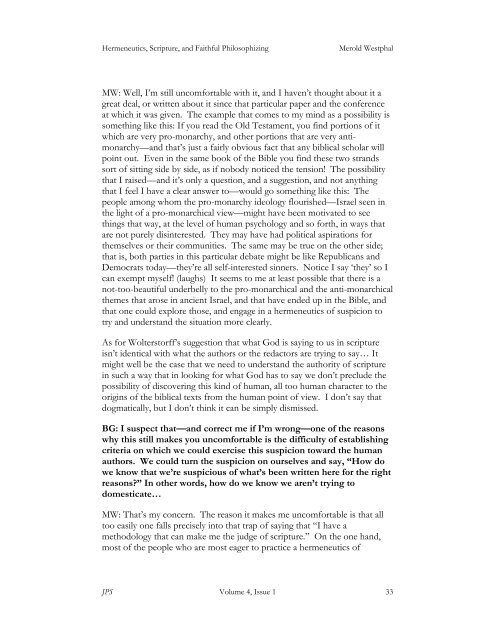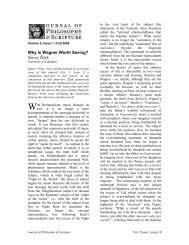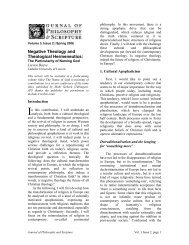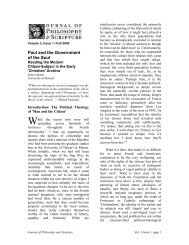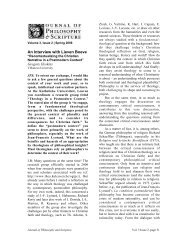interview with Merold Westphal - Journal of Philosophy and Scripture
interview with Merold Westphal - Journal of Philosophy and Scripture
interview with Merold Westphal - Journal of Philosophy and Scripture
Create successful ePaper yourself
Turn your PDF publications into a flip-book with our unique Google optimized e-Paper software.
Hermeneutics, <strong>Scripture</strong>, <strong>and</strong> Faithful Philosophizing <strong>Merold</strong> <strong>Westphal</strong><br />
MW: Well, I’m still uncomfortable <strong>with</strong> it, <strong>and</strong> I haven’t thought about it a<br />
great deal, or written about it since that particular paper <strong>and</strong> the conference<br />
at which it was given. The example that comes to my mind as a possibility is<br />
something like this: If you read the Old Testament, you find portions <strong>of</strong> it<br />
which are very pro-monarchy, <strong>and</strong> other portions that are very antimonarchy—<strong>and</strong><br />
that’s just a fairly obvious fact that any biblical scholar will<br />
point out. Even in the same book <strong>of</strong> the Bible you find these two str<strong>and</strong>s<br />
sort <strong>of</strong> sitting side by side, as if nobody noticed the tension! The possibility<br />
that I raised—<strong>and</strong> it’s only a question, <strong>and</strong> a suggestion, <strong>and</strong> not anything<br />
that I feel I have a clear answer to—would go something like this: The<br />
people among whom the pro-monarchy ideology flourished—Israel seen in<br />
the light <strong>of</strong> a pro-monarchical view—might have been motivated to see<br />
things that way, at the level <strong>of</strong> human psychology <strong>and</strong> so forth, in ways that<br />
are not purely disinterested. They may have had political aspirations for<br />
themselves or their communities. The same may be true on the other side;<br />
that is, both parties in this particular debate might be like Republicans <strong>and</strong><br />
Democrats today—they’re all self-interested sinners. Notice I say ‘they’ so I<br />
can exempt myself! (laughs) It seems to me at least possible that there is a<br />
not-too-beautiful underbelly to the pro-monarchical <strong>and</strong> the anti-monarchical<br />
themes that arose in ancient Israel, <strong>and</strong> that have ended up in the Bible, <strong>and</strong><br />
that one could explore those, <strong>and</strong> engage in a hermeneutics <strong>of</strong> suspicion to<br />
try <strong>and</strong> underst<strong>and</strong> the situation more clearly.<br />
As for Wolterstorff’s suggestion that what God is saying to us in scripture<br />
isn’t identical <strong>with</strong> what the authors or the redactors are trying to say… It<br />
might well be the case that we need to underst<strong>and</strong> the authority <strong>of</strong> scripture<br />
in such a way that in looking for what God has to say we don’t preclude the<br />
possibility <strong>of</strong> discovering this kind <strong>of</strong> human, all too human character to the<br />
origins <strong>of</strong> the biblical texts from the human point <strong>of</strong> view. I don’t say that<br />
dogmatically, but I don’t think it can be simply dismissed.<br />
BG: I suspect that—<strong>and</strong> correct me if I’m wrong—one <strong>of</strong> the reasons<br />
why this still makes you uncomfortable is the difficulty <strong>of</strong> establishing<br />
criteria on which we could exercise this suspicion toward the human<br />
authors. We could turn the suspicion on ourselves <strong>and</strong> say, “How do<br />
we know that we’re suspicious <strong>of</strong> what’s been written here for the right<br />
reasons?” In other words, how do we know we aren’t trying to<br />
domesticate…<br />
MW: That’s my concern. The reason it makes me uncomfortable is that all<br />
too easily one falls precisely into that trap <strong>of</strong> saying that “I have a<br />
methodology that can make me the judge <strong>of</strong> scripture.” On the one h<strong>and</strong>,<br />
most <strong>of</strong> the people who are most eager to practice a hermeneutics <strong>of</strong><br />
JPS Volume 4, Issue 1 33


